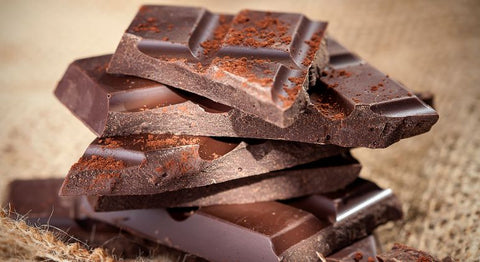on purchases over €75
on purchases over €75

Most tutors know that chocolate is forbidden to their four-legged friends. However, when we read posts about it on social media, we see comment after comment saying “My dog had chocolate once and it was fine.”
There are even those who take things even further. I recently saw a TikTok video in which a group of clearly stupid people gave chocolate bars to a dog... just to see what would happen. This video infuriated me! The truth is: Chocolate is toxic to dogs.
Chocolate contains caffeine, as well as a chemical called theobromine (this is a bitter, volatile compound obtained from cocoa beans. It is an alkaloid that resembles caffeine in its physiological effects.) .
Dogs cannot metabolize these compounds as well as humans, so they are much more sensitive to their effects.
According to experts, chocolate is rarely fatal for a dog. However, depending on the type of chocolate and the amount ingested, it can cause:
In more severe cases, symptoms can also include muscle tremors, fainting and heart failure.

This is the question that all tutors ask when talking about chocolate and dogs.
It's true: dogs that accidentally eat an M&M or two or a piece of chocolate that's fallen to the ground are unlikely to suffer from chocolate poisoning.
But, when we talk about toxicity levels, they vary depending on several factors.
Let's put this in perspective. According to the US Veterinary Association, “A medium-sized dog, weighing about 22.5 pounds, would only have to ingest 28.35 grams of confectioner's chocolate, or 255 grams of milk chocolate, to show symptoms of poisoning. .”
According to the US Pet Poison Helpline, “White chocolate has very little theobromine and does not cause chocolate poisoning in dogs.” However, we advise tutors to keep white chocolate away from furry family members. This is because this chocolate may contain other ingredients — such as coconut butter, sugar, cream — that can cause stomach aches and even pancreatitis in dogs.
To help better understand how different types of chocolate can impact your dog, visit this Online Chocolate Toxicity Calculator created by VetsNow. This is a very useful guide.
If you suspect that your dog has eaten chocolate, you should call your veterinarian immediately. Give as many details as possible: what kind of chocolate was ingested by your dog (if possible, keep the packaging) and how much you think he may have ingested . In addition, inform the Veterinarian about your dog's weight.
You will have to follow the Veterinarian's instructions and possibly have to go to a veterinary clinic or hospital.
Depending on the severity of the poisoning, the Veterinarian may induce vomiting in your dog, as well as take a series of other measures to restore your dog's well-being.
Surely you have noticed those gourmet dog biscuits with a "chocolate" coating? Or dog biscuits that look like they have chocolate chips inside? Well, there's nothing to worry about as it's not actually chocolate. It's carob… which is super tasty and totally safe for your dog.

While chocolate comes from cocoa beans, carob chips are made from the pod of a carob tree. Inside the pod is sweet pulp that is dried, roasted and ground into a powder.
You can find carob powder and carob chips in many stores. It is naturally sweet and tends to have a more nutty flavor than chocolate.
Although pet poison control centers report an increase in chocolate poisoning during holidays — such as Easter and Halloween — they receive calls daily.
I know that many owners question how toxic chocolate really is, as they say their dogs have eaten it before without getting sick.
To summarize, toxicity has everything to do with the type and amount consumed.
Remember: even small amounts of the darkest chocolates can be dangerous. Keep chocolate away from your four-legged pups at all times.
It's not worth the risk! Don't leave chocolate on areas your dog can reach, such as counters, tables, and desks.
Instead, make sure all the chocolate is kept in the pantry or in a closed cupboard and on a high shelf.
{"one"=>"Select 2 or 3 items to compare", "other"=>"{{ count }} of 3 items selected"}
Leave a comment